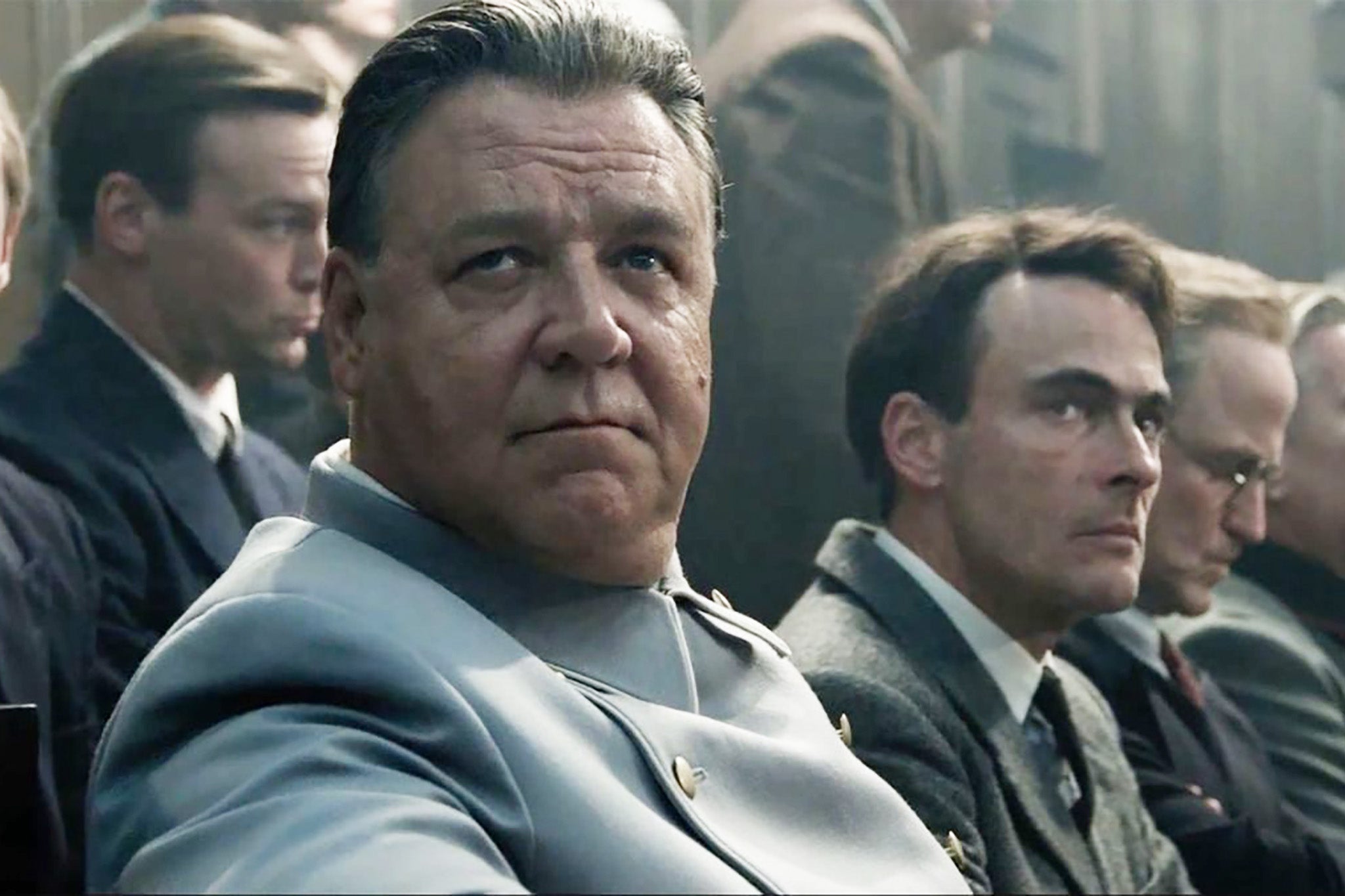There are more zingers than you’d expect in Nuremberg, which dramatises the trial of Nazi commander Hermann Göring. Stretches of it, in fact, are paced like we’re chasing the downfall of crafty mobsters rather than the architects of the unthinkable. Various high-ranking members of the party are introduced with the zap-pow of newspaper headlines, technicolour recreations, and salacious details. Robert Ley was captured in his pyjamas, didn’t you know?
It makes sense, in part, for the story being told here. Yet Nuremberg can ultimately only justify its Hollywood sheen for so long. The film’s written and directed by James Vanderbilt, behind the screenplays for both David Fincher’s Zodiac (2007) and the Adam Sandler-Jennifer Aniston Murder Mystery comedies, and he draws here mostly from Jack El-Hai’s 2013 non-fiction book The Nazi and the Psychiatrist.
The Nazi in question is Göring (Russell Crowe). The psychiatrist is Douglas Kelley (Rami Malek), brought in to ensure the imprisoned Nazi high command don’t kill themselves before they can stand trial. Kelley has a bigger picture in mind: if he can “dissect evil” – slap a label on the psychological dysfunction that drives these men to barbarity – then he’ll have a bestseller on his hands.
Crowe and Malek are well cast for this kind of dance. The former is a battering ram of an onscreen presence, mixed here with an unnerving sense of comfort in his surroundings – at one point, we see him lounging on his prison cell mattress like he’s expecting to be hand-fed grapes. Malek, meanwhile, can do a slippier, quieter charm, a smile with a thousand lines of code doing the analysis behind it.
And while it’s a little much to follow the line, “who’s bigger than the president?” with a comedy smash cut to the Vatican, the form at least fits the function: the Allies have freshly won the war, and while there are whispers of what’s gone on in the so-called “labour camps”, these men all wear the thrill of victory on their breasts.
But, while lawyers Robert H Jackson (Michael Shannon) and David Maxwell Fyfe (Richard E Grant) postulate about righteous justice, all while Brian Tyler’s score rallies them onward, you’re quietly waiting for the curtain to draw back and the mouth of hell itself to be revealed.

When it does, Vanderbilt presents it starkly and truthfully, in the same way Stanley Kramer did in 1961’s Judgment at Nuremberg, by showing the audience real footage captured by American and British soldiers after the liberation of the Nazi concentration camps. For a few moments, everything stills. All we hear is the whir of the projector. All we see is the horror. Kelley’s pristine world, built out of the lies he swallowed so he could sit across from Göring each day and talk to him like an associate (or maybe even a friend), collapses in an instant.
And yet, the film doesn’t follow where he goes. Soon enough, we’re back in safe, old Hollywood world, with a declaration nearly to camera that we “might as well go finish the war”. Nuremberg’s closing titles reveal how much Kelley was truly affected by the trials, in his fears that all these promises that only the rule of the law can break the terrible cycles of history were for naught, or that the perpetrators of genocide and slaughter possess some unique quality unseen in their fellow man.
What should represent the soul of this film is merely its coda. While it pleads for us to reckon with the ugliest of truths, it shuts the curtains before its own reckoning is done.
Dir: James Vanderbilt. Starring: Russell Crowe, Rami Malek, Leo Woodall, John Slattery, Mark O’Brien, Colin Hanks, Wrenn Schmidt, Lydia Peckham, Richard E Grant, Michael Shannon. Cert 15, 148 mins
‘Nuremberg’ is in cinemas from 14 November








